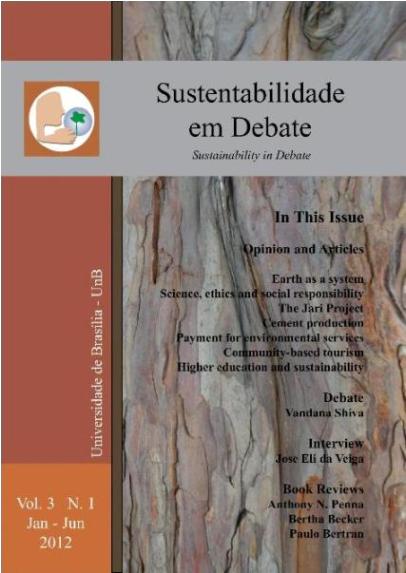O Projeto Jari, gerido pelo Grupo Orsa:
Responsabilidade Social Corporativa aplicada ao contexto da Amazônia
DOI :
https://doi.org/10.18472/SustDeb.v3n1.2012.7197Mots-clés :
Amazônia brasileira, Projeto Jari, Populações tradicionais, Agro-extrativismo agronegócio, Conflito de terra, Socioambientalismo, Responsabilidade social e ambiental de empresasRésumé
O desenvolvimento da região do Jari está sendo, desde a metade do século XX, indissociavelmente ligado à evolução do Projeto Jari, um grande empreendimento agroindustrial privado, cujo objetivo é a produção de celulose em larga escala. Fortemente polêmico nas décadas de 1970 e 1980 devido ao impacto ambiental e ao desperdício de recursos humanos em suas atividades de agronegócio, e também por não ser economicamente rentável, o projeto foi enfim retomado por uma nova empresa (o grupo Orsa), após uma quase bancarrota em 1997. Sob uma nova gestão, centrada no conceito de responsabilidade social e ambiental de empresas, o Projeto Jari do século XXI emerge como um empreendimento moderno, viável, certificado e pioneiro em matéria de responsabilidade de empresas no contexto amazônico. Esse artigo discute as diferentes estratégias desenvolvidas pelo grupo Orsa, assim como os proveitos e os inconvenientes, tanto para a empresa como para as populações locais da região do Jari, nos dias de hoje.
Références
Positioning Stakeholder Theory within the Debate
on Corporate Social Responsibility, Electronic
Journal of Business Ethics and Organization
Studies, Vol. 12, n° 1, p. 5-15.
CAPPELIN, P., and GIULIANI, G.M., 2004, The
Political Economy of Corporate Responsibility
in Brazil. Social and Environmental
Dimensions, Technology, Business and
Society, Program Paper Number 14, October
2004, United Nations Research Institute for Social
Development, (UNRISD), 82 p.
CARROL, 1999, Corporate Social Responsibility:
evolution of a definitional construct”.
Business and society, Vol. 38, n°3, p. 268-295.
CASTELL, M., 1996, The rise of the network
society. 2nd ed. New York: Blackwell, 566p.
FRIEDMAN, M., 1970, The social responsibility
of business is to increase its profits, New York
Times, Sept. 3rd, pp. 405-409.
GALL, N., 1979, Ludwig’s Amazon Empire,
Forbes, May 14th, p.127- 144.
GREISSING, 2010, A região do Jari, do
extrativismo ao agronegócio: As contradições do
desenvolvimento econômico na Amazônia forestal
no exemplo do Projeto Jari. Revista de Estudos
Universitários da Universidade de Sorocaba.
Dossiê Amazônia. ( http://periodicos.uniso.br/
index.php/reu/issue/current
GREISSING, 2011, 50 ans d’histoire du projet
Jari. ( D’un grand projet contesté Ã un modèle
d’éthique entrepreneuriale ?, L’Espace Politique,
15 | 2011-3.
http://espacepolitique.revues.org/index2118.html
GREISSING, 2012, La région du Jari, un
laboratoire en Amazonie, soon available online on
the open archives webseite HAL-SHS, http://
halshs.archives-ouvertes.fr/.
GRUPO ORSA, 2005, Relatório
socioeconómico ambiental, 117p.
GRUPO ORSA, 2008, Relatório de
sustentabilidade, 41p.
GRUPO ORSA, 2010, Relatório anual e de
Sustentabilidade, http://relatorioweb.com.br/
orsa/10/
HÄGESTRAND, T., 1952, Innovation diffusion
as a spatial process, Chicago : University of
Chicago Press, 1967.
HEATH and NORMAN, 2004, Stakeholder
Theory, Corporate Governance and Public
Management, What can the history of state-run
enterprises teach us in the post-Enron era ?,
Journal of Business Ethics, Vol. 53, p. 247-265.
JENSEN, M.C., 2001, Value Maximization,
Stakeholder Theory and the Corporate Objective
Function, Harvard Business School Working
Paper 01-01. http://papers.ssrn.com/sol3/
papers.cfm?abstract_id=220671.
MAIMON, D., 1994, Responsabilidade ambiental
das empresas brasileiras : realidade ou discourso ?
In : CAVALCANTI (Org.), Desenvovlimento e
natureza : Estudos para uma sociedade sustentável.
INPSO/FUNDAJ, Instituto de Pesquisas
Sociais, Fundacao Joaquim Nabuco, Ministerio
de Educacao, Governo Federal, Recife, Brasil.
Octubre 1994. p. 262. http://168.96.200.17/ar/
libros/brasil/pesqui/cava l c a n t i . rtfMC
WILLIAMS ET AL., 2005
MIFANO, G., 2002, A crise mundial de confiança
nas empresas : uma questão de Responsabilidade
Social, http://www.ethos.org.br/
docs/conceito_praticas/publicações/Debates/
a_crise Bibliographie 410 mundial.ppt.
REVISTA GLOBO RURAL 31: Lucro Verde na
Floresta, Mars 2012.
http://www.grupoorsa.com.br/revista_globo/
grupo_orsa_madeira_legal_globo_rural.pdf
RICO DE MELO, E., 2004, A responsabilidade
social empresarial e o estado, uma aliança para o
desenvolvimento sustentável. São Paulo em Perspectiva,
18 (4): p. 73-82.
STERNBERG, E., 1997, et al.. The defects of
stakeholder theory. Corporate Governance, Vol.
5 (1): 3-10.
STIGLITZ, J. E., 1989, Imperfect information in
the product Market, in SCHMALENSEE, P.,
SUNDARAM, A. K. and INKPEN, A. C., 2004,
The Corporate Objective Revisited,
Organization Science, Vol. 15 n°. 3, pp. 350-363.
WALDMAN ET AL., 2006, D.A., et al., 2006,
Cultural and leadership predictors of corporate
social responsibility values of top management: a
GLOBE study of 15 countries, Journal of
International Business Studies 37, 823-837.
Téléchargements
Publié
Numéro
Rubrique
Licence
SUSTAINABILITY IN DEBATE – Copyright Statement
The submission of original scientific work(s) by the authors, as the copyright holders of the text(s) sent to the journal, under the terms of Law 9.610/98, implies in the concession of copyrights of printed and/or digital publication to the Sustainability in Debate Journal of the article(s) approved for publication purposes, in a single issue of the journal. Furthermore, approved scientific work(s) will be released without any charge, or any kind of copyright reimbursement, through the journal’s website, for reading, printing and/or downloading of the text file, from the date of acceptance for publication purposes. Therefore, the authors, when submitting the article (s) to the journal, and gratuitous assignment of copyrights related to the submitted scientific work, are fully aware that they will not be remunerated for the publication of the article(s) in the journal.
The Sustainability in Debate Journal is licensed under Creative Commons License – Non-Commercial-No-Derivation Attribution (Derivative Work Ban) 3.0 Brazil, aiming at dissemination of scientific knowledge, as indicated on the journal's website, which allows the text to be shared, and be recognized in regards to its authorship and original publication in this journal.
Authors are allowed to sign additional contracts separately, for non-exclusive distribution of the works published in the Sustainability in Debate Journal (for example, in a book chapter), provided that it is expressed the texts were originally published in this journal. Authors are allowed and encouraged to publish and distribute their text online, following publication in Sustainability in Debate (e.g. in institutional repositories or their personal pages). The authors expressly agree to the terms of this Copyright Statement, which will be applied following the submission and publishing by this journal.









